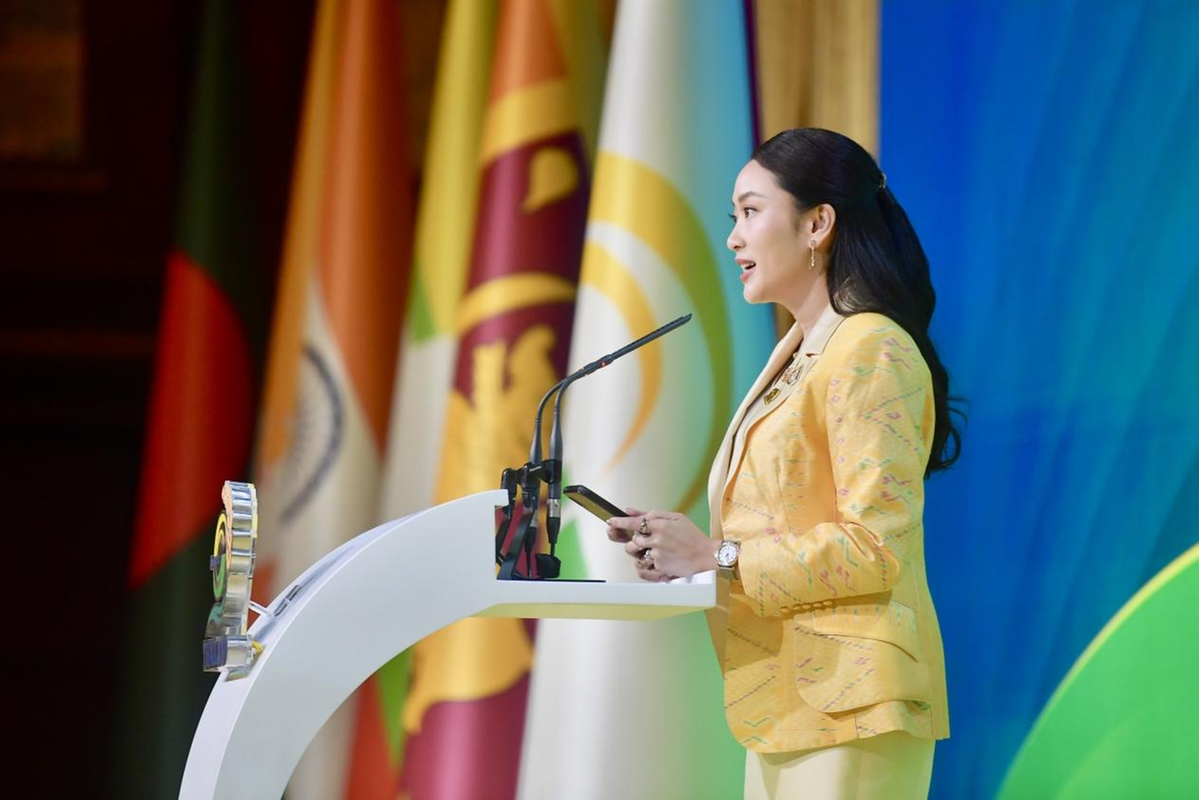
Thai Prime Minister Paetongtarn Shinawatra announces major achievements at the the 6th BIMSTEC summit in Bangkok on Friday. [Photo provided to chinadaily.com.cn]
Countries in the Bay of Bengal region are expecting closer economic integration and connectivity as the sixth Summit of the Heads of State/Governments of the member States of the Bay of Bengal Initiative for Multi-Sectoral Technical and Economic Cooperation, or BIMSTEC, concluded on Friday.
BIMSTEC comprises seven countries of the Bay of Bengal region, namely Bangladesh, Bhutan, India, Myanmar, Nepal, Sri Lanka, and Thailand.
As the host country, Thailand saw its Prime Minister Paetongtarn Shinawatra announcing the signing of six documents at the conclusion of the event in Bangkok.
Leaders of the member states approved the BIMSTEC Bangkok Vision 2030 -- a key highlight of the summit that focuses on enhancing economic integration, connectivity, and human security and outlines a strategic plan to build a prosperous, resilient and open "PRO BIMSTEC" by 2030.
The 6th BIMSTEC Summit Declaration and the Rules of Procedure for BIMSTEC Mechanisms were also released, which reaffirm member countries commitment and provide a more systematic and rules-based framework for BIMSTEC operations, ensuring greater efficiency and consistency.
The Report of the BIMSTEC Eminent Persons' Group on the Future Direction of BIMSTEC was also unveiled during the summit, offering key recommendations that align with the BIMSTEC Bangkok Vision 2030.
"We also witnessed the signing of the Agreement on Maritime Transport Cooperation. It will strengthen maritime connectivity between South and Southeast Asia, improve logistical efficiency, reduce trade costs, and enhance the movement of goods and people," said Paetongtarn.
She noted that the meeting also endorsed BIMSTEC Leaders' Joint Statement on the Impact of the Earthquake in Myanmar and Thailand. This joint statement expresses condolences, solidarity, and commitment to supporting the affected countries. It also aims to reflect Thailand's firm collaboration in disaster management and to strengthen Thailand's response mechanisms for natural disasters.
Paetongtarn added that outcomes of this summit will also deliver concrete and tangible benefits to the Thai people. For example, The Agreement on Maritime Transport Cooperation will reduce shipping costs and improve supply chain efficiency — making Thai exports more competitive and create new market and investment opportunities.
"Enhanced people-to-people exchanges through tourism and cultural cooperation will boost Thailand's tourism sector and create new job opportunities. Ultimately, these outcomes will translate into greater economic opportunities and improved livelihoods for the Thai people," she said.
Prior to the summit, Thailand welcomed the official visits of Prime Minister of Nepal on April 2, marking the first-ever official visit to Thailand by a prime minister of Nepal. Eight agreements and Memorandum of Understanding were signed during this visit.
During April 3 and 4, Prime Minister of India Narendra Modi also paid a visit to Thailand. Together they announced the elevation of Thailand-India relations to a Strategic Partnership. Both sides agreed to enhance cooperation in various areas including political and defense cooperation, trade and investment, physical, digital and people-to-people connectivity, culture and tourism.
It pursues regional cooperation in several sectors, such as agriculture and food security, connectivity, environment and climate change, science, technology and innovation.